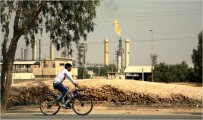
Iraq’s reserves of oil are among the largest in the world yet the country has endured all but non-stop warfare and dictatorship for much of the last few decades. A large portion of its oil is located around Basra, in the south of the country. As the New York Times explains in an evocative story today, the oil has not brought any wealth to the people who live on top of it. The paradox of plenty, alas, episode 9,683…
Despite the riches trapped below its oil fields, though, this city of three million is among Iraq’s poorest places. People in neighborhoods within a few miles of fields with so much oil that it floats atop the surface in huge black pools live amid mud and feces. Carts pulled by overworked donkeys compete with cars for space on streets. Childhood cancer rates are the highest in the country. The city’s salty tap water makes people ill. And there is more garbage on the streets than municipal collectors can make a dent in. The hundreds of thousands who live in the villages around the fields all dream of finding oil work, but that is unlikely. Those who apply are almost always told they lack the education or experience for oil work. But they believe that their only real deficiency is a lack of connections and money for bribes. “People sit here in the evenings and they watch the flames and wonder how rich they would be if they had only one hour of those oil exports,” said Naeem al-Moussuawi, who lives in one of the poorer villages in the Basra area.

